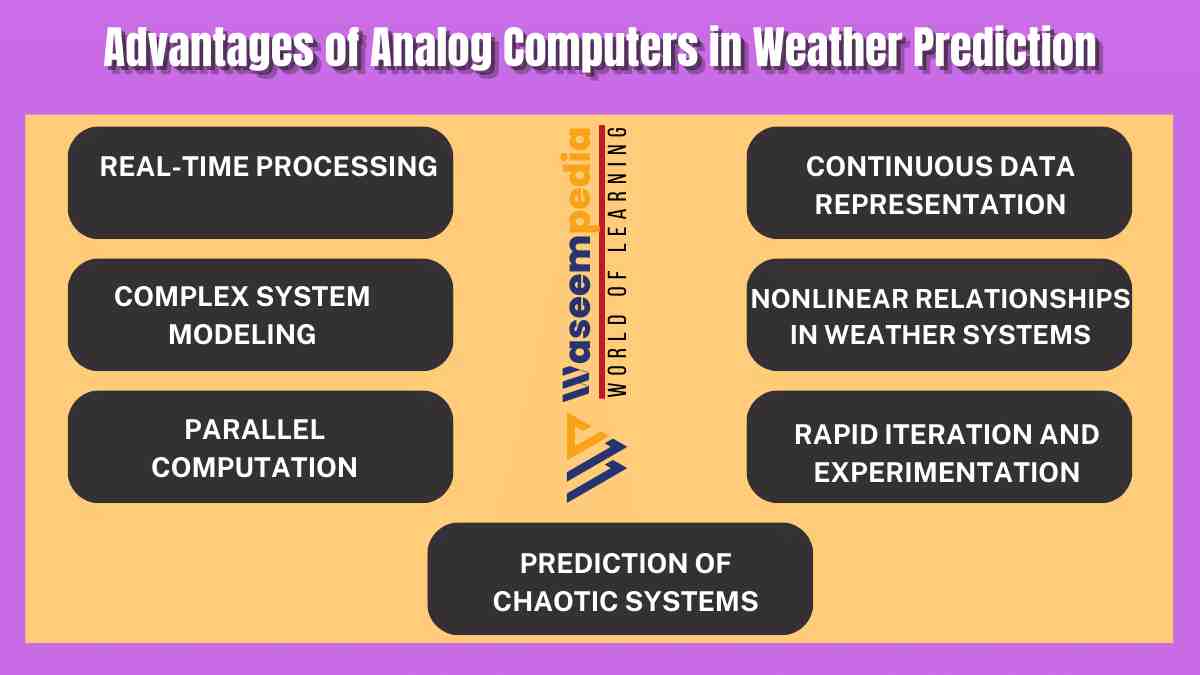Analog computers having many advantages in weather prediction, Such as real-time processing, continuous data representation, complex system modeling, capturing nonlinear relationships, parallel computation, rapid iteration and experimentation, and prediction of chaotic systems. While digital computers have transformed weather prediction, analog computers continue to provide unique capabilities in certain aspects of the forecasting process.
The combination of analog and digital approaches contributes to more accurate weather predictions, enabling forecasters to better understand and anticipate atmospheric conditions. In this article, we will read the advantages of analog computers in weather prediction.

Weather prediction involves analyzing vast amounts of meteorological data to forecast future weather conditions. It requires processing complex atmospheric models, simulating weather patterns, and predicting the evolution of weather systems.
Digital computers have revolutionized weather prediction, but analog computers offer specific advantages that complement the capabilities of digital systems. By leveraging the continuous nature of analog computation, analog computers can provide unique insights and contribute to more accurate weather predictions.
What is Analog Computers?
Analog computers process information using continuous physical quantities, such as voltages or currents, to represent and manipulate data. Unlike digital computers that operate on discrete values, analog computers can directly model and simulate real-world phenomena. In the context of weather prediction, analog computers can leverage their continuous nature to capture the complex dynamics of atmospheric systems and enhance forecasting capabilities.
7 Advantages of Analog Computers in Weather Prediction
7 Advantages of Analog Computers in Weather Prediction are as following.
1. Real-Time Processing
Real-time processing is one advantages of Analog Computers in Weather Prediction.It is critical in weather prediction, as it requires analyzing and reacting to rapidly changing atmospheric conditions. Analog computers excel in real-time processing due to their ability to work with continuous data streams without the need for digitization or discretization.
This real-time capability allows analog computers to provide immediate feedback and enable forecasters to monitor and adjust weather models as conditions evolve in real-time.
2. Continuous Data Representation
Analog computers utilize continuous data representation, which is highly advantageous in weather prediction. Weather systems are characterized by continuous and complex interactions between atmospheric variables. Analog computers can directly represent and manipulate these continuous variables without the need for data quantization or sampling.
This continuous data representation allows forecasters to capture fine-grained details of weather patterns and achieve more accurate simulations of atmospheric phenomena.
3. Complex System Modeling
Weather systems are inherently complex, with numerous interrelated variables and intricate relationships. Analog computers are well-suited for modeling these complex systems, as they can directly simulate the continuous dynamics of weather patterns.
By leveraging the continuous nature of computation, analog computers can accurately capture the interactions between atmospheric variables, enabling forecasters to generate more realistic and precise weather predictions.
4. Nonlinear Relationships in Weather Systems
Weather systems exhibit nonlinear behavior, making their modeling and prediction challenging. Analog computers are particularly effective in capturing and analyzing nonlinear relationships in weather systems. The continuous and parallel nature of analog computation allows for more accurate representation and simulation of nonlinear atmospheric dynamics.
Analog computers enable forecasters to study the effects of nonlinear phenomena, such as chaotic behavior, and enhance the understanding of complex weather patterns.
5. Parallel Computation
Analog computers are inherently parallel computing machines, capable of processing multiple computations simultaneously. This parallel processing capability is advantageous in weather prediction, where numerous computations need to be performed simultaneously to simulate various aspects of atmospheric behavior.
Analog computers can efficiently handle the parallel nature of weather systems, enabling forecasters to process large amounts of data in parallel and accelerate the simulation of weather patterns.
6. Rapid Iteration and Experimentation
Analog computers facilitate rapid iteration and experimentation in weather prediction. Forecasters can quickly adjust parameters, modify atmospheric models, and observe the immediate effects in real-time. Analog computers offer a hands-on approach to weather prediction, allowing forecasters to interact directly with the simulated environment and experiment with different scenarios.
This iterative process of experimentation enables faster learning, optimization, and refinement of weather models, leading to improved forecasting accuracy. So, Prediction of Chaotic Systems is also very important advantages of anlog computer in Weather Prediction
7. Prediction of Chaotic Systems
Weather systems exhibit chaotic behavior, which means small changes in initial conditions can lead to significant differences in long-term predictions. Analog computers are well-suited for predicting chaotic systems due to their ability to faithfully reproduce continuous and sensitive dynamics.
By leveraging the continuous nature of computation, analog computers enable forecasters to capture the sensitivity of weather systems to initial conditions, enhancing the understanding and prediction of chaotic atmospheric phenomena.
Related FAQ’s
How do analog computers differ from digital computers in weather prediction?
Analog computers process continuous data and directly model weather systems, while digital computers operate on discrete values and rely on algorithms for weather prediction.
What advantages do analog computers offer in weather prediction?
Analog computers excel in real-time processing, continuous data representation, complex system modeling, capturing nonlinear relationships, parallel computation, rapid iteration and experimentation, and prediction of chaotic systems.
Why is real-time processing important in weather prediction?
Real-time processing enables forecasters to monitor and adjust weather models as atmospheric conditions evolve, facilitating more accurate and timely weather predictions.
How do analog computers handle complex weather systems in prediction?
Analog computers can directly simulate the continuous dynamics of weather patterns, allowing forecasters to capture the interactions between atmospheric variables and generate more realistic predictions.
Why are analog computers effective in predicting ?
Analog computers can faithfully reproduce the continuous and sensitive dynamics of chaotic weather systems, enhancing the understanding and prediction of chaotic atmospheric phenomena.

